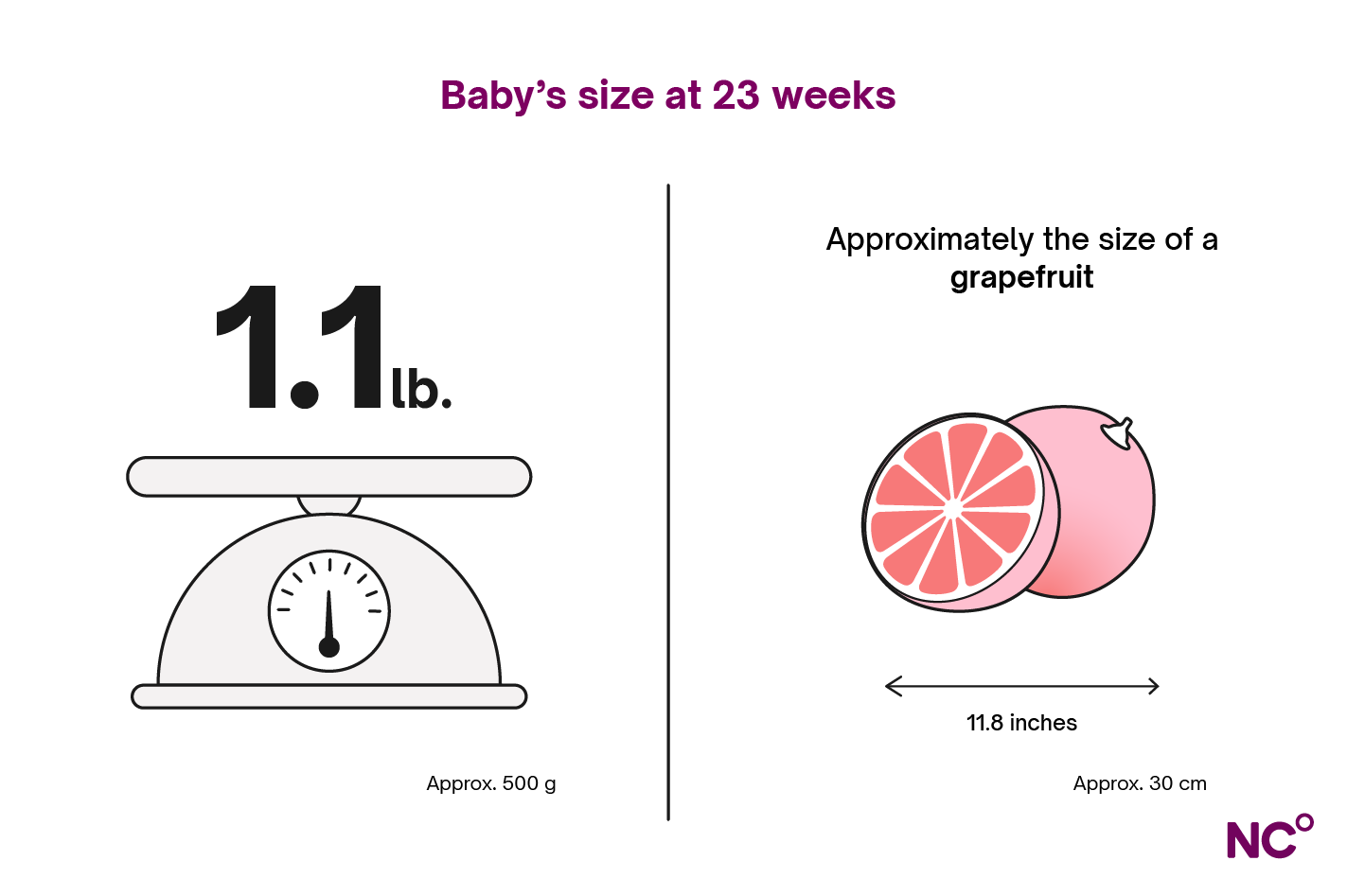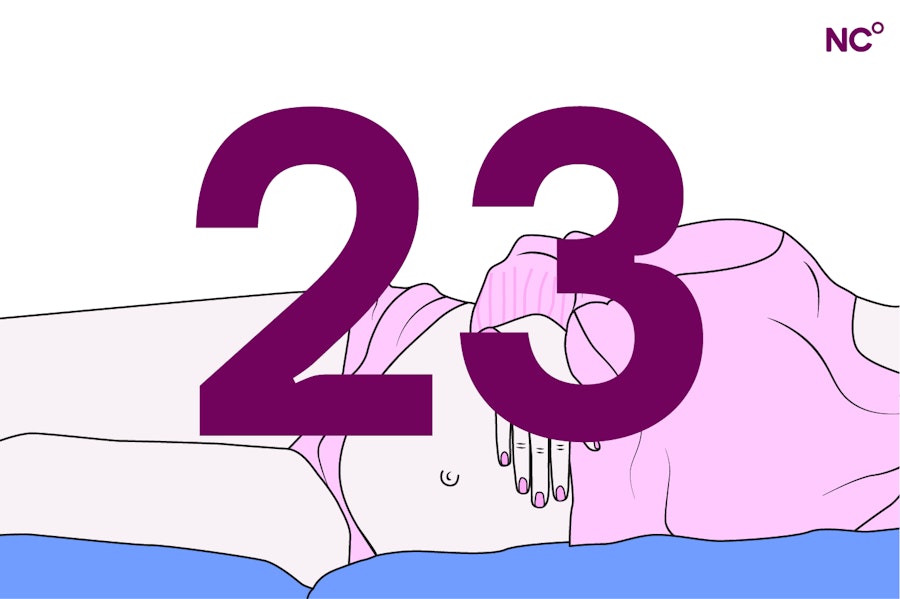23 Weeks pregnant: Symptoms, baby development, & tips
Follows NC° Editorial Policy
At Natural Cycles, our mission is to empower you with the knowledge you need to take charge of your health. At Cycle Matters, we create fact-checked, expert-written content that tackles these topics in a compassionate and accessible way. Read more...
Key takeaways
- “Pregnancy”, “baby", and “mommy” brain are all used to describe changes to your brain structure during pregnancy (and postpartum) that can affect your memory and cognition
- As your baby grows, you will notice their movements more — no need to count these just yet, but it’s good to familiarize yourself with what it feels like
- Pregnancy affects most of your body’s systems, from taste and smell to even your eyes, resulting in sometimes unexpected changes to your appetite and your vision.
Welcome to week 23 of your pregnancy! You have now been pregnant for about six months, and have only three left to go! In this week’s guide, we will cover some pregnancy-related body changes like cravings, aversions, forgetfulness, and vision changes. We will also check in on your baby, who you are probably feeling move more and more with each passing week. Finally, we will discuss how to manage piles, or hemorrhoids, during pregnancy and offer some other useful tips for caring for your physical and mental health this week.
Your body at week 23
Pregnancy cravings
Food cravings or aversions during pregnancy are normal and expected, though not experienced by everyone. While scientists aren’t sure exactly what causes pregnancy cravings, most studies suggest that changes in your senses of taste and smell are linked to hormone fluctuations [1]. Evidence has also indicated similarities in cravings within certain cultures, suggesting that your cultural background could also play a role.
In most cases, cravings and aversions are harmless and no cause for concern. It’s important to try to maintain a healthy diet, so that you can provide your body with the energy and nutrients it needs. While gaining weight during pregnancy is healthy and expected, unhealthy weight gain can contribute to poorer health outcomes for you and your baby.
Pica is a craving for things that have little or no nutritional value, most often non-food substances like dirt or chalk [2]. It is unknown why some women develop pica during pregnancy. Remember that consuming non-food substances can be harmful to both you and your baby. If you experience pica or are concerned about any of your cravings or aversions, talk with your healthcare provider.
Forgetfulness
Are you having a hard time remaining focused at work or remembering tasks on your to-do list? “Pregnancy brain” or “baby brain” are both common terms used, even in the scientific literature, to describe the memory lapses and forgetfulness experienced by an estimated 50-80% of women during pregnancy. Rather than viewing these changes as cognitive decline, many scientists now believe that forgetfulness and brain fog are actually the result of structural changes your brain makes as it optimizes and prepares for child-rearing [3].
While “pregnancy brain” can disappear for some women soon after giving birth, it is normal for symptoms to linger. Some studies have found that symptoms of “mommy brain” can last for up to two years postpartum, as your neurological system continues to evolve and adapt through the first years of your baby’s life [3]. Both sleep deprivation and mental health conditions like depression (during pregnancy and/or postpartum) are also believed to contribute to cognitive issues during and after pregnancy.
If you are feeling concerned about any issues you are experiencing during pregnancy relating to memory or cognitive functioning, talk with your nurse, doctor, or GP.
Vision changes
Pregnancy causes major changes to pretty much all the body’s systems, and this includes your vision! Vision issues during pregnancy are typically broken into three categories [4]:
First-time issues directly linked to pregnancy
Common issues that can arise because of pregnancy include changes to the pigmentation on the eyelids, dry eyes, cornea or lens changes, and greater instances of eye infections on account of lowered immunity. Changes to the cornea thickness, sensitivity, and curvature can all affect refraction. This can make vision blurry and even make wearing contact lenses uncomfortable. Because of changes to the cornea and lens, ophthalmologists typically recommend waiting at least several weeks after pregnancy to undergo any laser eye treatments or vision correction.
Existing issues that are changed by pregnancy
Pregnancy can also change existing eye conditions like diabetic retinopathy and glaucoma. Diabetic retinopathy is a retina condition caused by type 1 and type 2 diabetes. However, it is not caused by or linked to gestational diabetes. Glaucoma is a type of eye condition that affects the optic nerve. Pressure changes (known as intraocular pressure, or IOP) during pregnancy can affect glaucoma symptoms. It’s important to speak with your doctor about any medications you take to treat pre-existing eye conditions to discuss their safety and efficacy during pregnancy.
Vision issues linked to other conditions or complications
Finally, it’s important to be aware that sudden blurred vision, flashing lights, or vision impairment due to a severe headache might be a sign of preeclampsia, which is a high blood pressure condition that requires immediate medical monitoring. If you experience these vision changes and/or sudden increased swelling in your face, hands, or feet, abdominal pain, or nausea, contact your healthcare provider immediately [5].
Your baby’s development at 23 weeks
With every passing week of your pregnancy, your baby is growing bigger, and it will become easier to feel their movements. This week, your baby is around the size of a grapefruit, likely weighing between 1-1.1 pounds (450 to 500g) and measuring 11 to 11.8 inches (28 to 30 centimeters) [6].

Your baby is developing its own sleep and wake patterns [7]. Remember, these are likely not the same as yours, which means they might be very active when you are sleeping, or trying to get to sleep.
Piles in pregnancy
Piles, also known as hemorrhoids, are unfortunately common, especially during the second and third trimesters of pregnancy, as well as postpartum. These swellings in and around your bottom (rectum and anus) commonly cause itching, burning, aching, soreness, and swelling that you might be able to feel with your hands, pain while pooping, and/or bleeding after passing a stool [8]. Strain and pressure on your rectum and anus, for example on account of constipation or labor, can cause piles.
Because constipation is one of the most widely recognized causes of piles during pregnancy, treating constipation is the main method for prevention. Eating a diet high in fiber, regular exercise (if recommended during your pregnancy), and staying hydrated are all recommended for treating constipation. There are also medicines like ointments, stool softeners, and suppositories that are available by prescription and over-the-counter, which are safe to use during pregnancy. If you are suffering from piles, talk to your pharmacist, nurse, or doctor about which treatment might be best for you.
Tips in week 23
- Practice relaxation: Whether you feel you need it or not, week 23 is a great time to start learning about different methods of relaxation. You can use these to calm down during the day, get ready for bed, or even during labor. Experiment with everything from deep breathing to meditation to yoga to music therapy to find out what works best for you.
- Hair treatments during pregnancy: You might have already noticed, but your hair can also change during pregnancy. Every pregnancy is different – some might experience hair loss while others might find themselves needing to get a haircut much more often! Hair texture and skin/scalp condition can also change in pregnancy [9]. While most hair treatments are considered safe during pregnancy, keep in mind that the results might vary from what you are used to experiencing [10]. Also be sure to inform your stylist or aesthetician that you are pregnant, and ask your healthcare team if you have questions about the safety of particular treatments.
- Remember sunblock: Changes to your skin’s pigmentation, known as melasma, and sensitivity can make you more prone to sunburn when you are pregnant [11]. Whether there are blue skies or clouds, it’s important to protect yourself from the sun by covering up and using a high-factor sunscreen on all exposed skin.
- Vitamins and supplements during pregnancy: Your body needs extra vitamins and minerals like folic acid, vitamin D, calcium, and iron during pregnancy to support you and your baby [12]. However, there are a lot of supplements on the market, and it can be confusing to know what to take. Follow the guidance of your healthcare team, and be sure to consult them before starting any extra vitamins or supplements.
- Monitoring your mental health: Your mental health is just as important as your physical health for both your well-being and your baby’s [13]. Be sure to keep an eye not only on your physical pregnancy symptoms, but also on how you are feeling day-to-day. If you are experiencing, or start to experience, stress or anxiety, communicate how you're feeling to your nurse, midwife, or doctor. They can offer important advice and recommendations for treating any mental health condition you might experience.
Using Natural Cycles during your pregnancy
If you have enjoyed this article, did you know that there’s an app that provides weekly pregnancy articles, guides on pregnancy-related health issues, and a way to track all your pregnancy symptoms? Natural Cycles is the first FDA Cleared birth control app, and NC° Follow Pregnancy is there to care for you through your pregnancy and as you recover postpartum. Why not see if NC is right for you today?
Did you enjoy reading this article?
